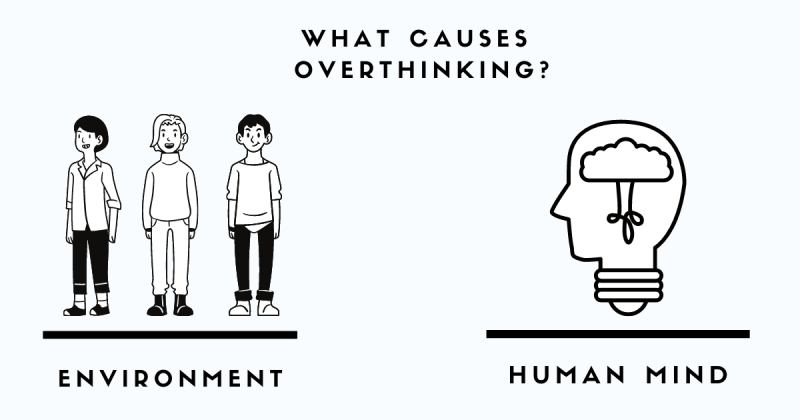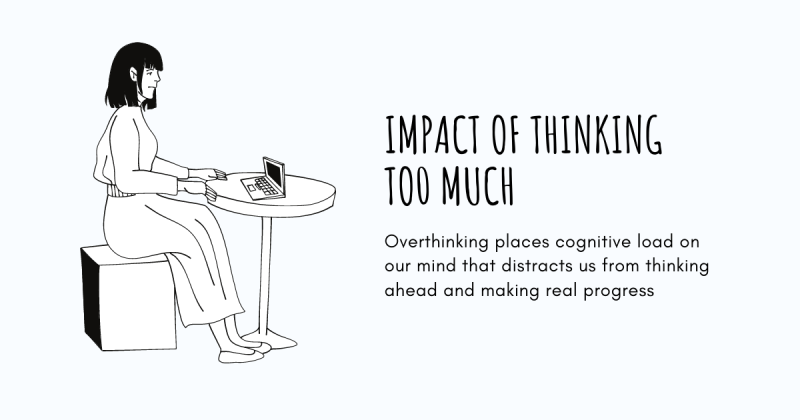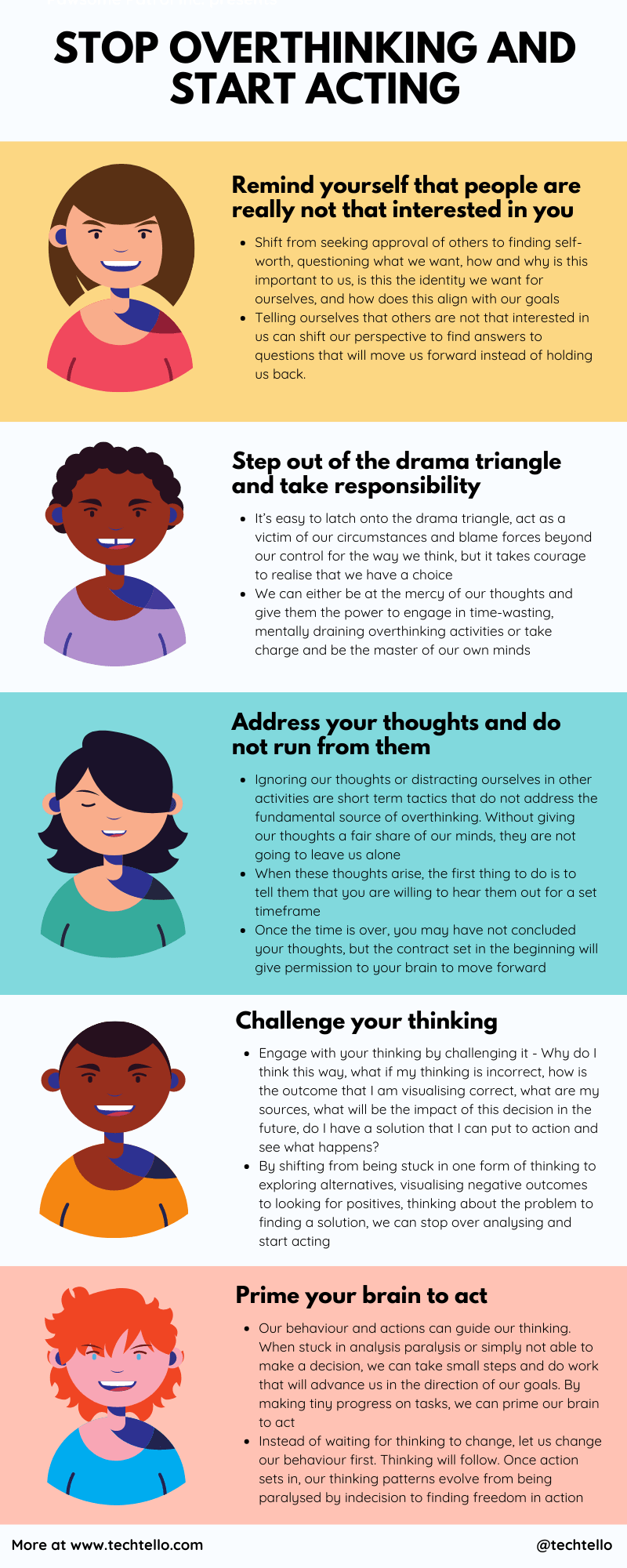5 Strategies to Stop Overthinking and Start Acting
5 Strategies to Stop Overthinking and Start Acting
Do you solve problems in your head instead of putting them to action? There’s a fine line between thinking and thinking too much. Learn how to make the shift.
Aug. 24, 20 · Agile Zone ·
Comment (0)
Join the DZone community and get the full member experience.

Yet, there were days when I was occupied with overthinking and being stuck in analysis paralysis without being productive. The moments when unwanted thoughts would pop into my mind without my own knowledge and drift me away from the task at hand. These little voices in my head would circle in a loop like a preset playlist often draining me of my mental resources.
I was completely unaware of them at first and would often wonder where the time went by. Later as I started consciously noticing them, I realized that most of these thoughts were related to over-analyzing my past actions and decisions or worrying too much about how the future will unfold – Why did I say that in the discussion, how will others think about how I acted the other day, did the meeting go well, what if my decision didn’t turn out as expected?
I tried to mute them by catching them and pretending that they don’t exist. But, it didn’t work. Without hearing them out and addressing the underlying root cause, they found a way to appear during my most vulnerable moments, more powerful and emotional than before.
With time, I realized that I cannot fix the past. Obsessing about the past or the things I could have done differently is not going to help, but I can always use the learning from my past to experience the present and create a better future.
While we are not our thoughts, what we make of our life is the thoughts we have, and how we put them to action. Inspired by Sahi Bahcall, a physicist and biotech entrepreneur "Instead of being in battle with your thoughts, be in partner with them"
Before we dive into some of the strategies that worked for me in taking charge of my own thoughts, it’s very important to understand what causes overthinking. Without understanding why and how these thoughts originate and attending to our core needs, we cannot overcome overthinking.
What Causes Overthinking?

1. Environment
The circumstances in which we are raised, the conditions in which we work, and the people around us form a large part of how we think.
If we are part of an environment where mistakes are punished, success celebrated and failures are looked upon as a sign of weakness, we tend to become overly cautious and watchful of everything we do. This translates into over-analyzing our decisions and their possible outcomes and also ruminating over our past actions.
If anxiety and tension are a normal part of our day-to-day life, people around us are toxic or demonstrate disruptive behavior, we naturally adopt those thinking patterns without realizing they aren’t our own thoughts and that we have a choice to think like them or stand apart and adopt more constructive thought patterns.
While our environment may not be under our control, we can take charge of our thoughts with some effort.
2. Mystery of the Human Mind
Multiple scientific studies show that failure sticks with us much longer than success. Success may give us momentary happiness, but our failures can live with us forever.
Once our mind gets stuck in the negatives, that’s all it sees. Every action and decision may become a battle within our mind as it tends to surface out only one form of thinking without the ability to shift.
Another strange reason that gives way to overthinking is the desire to be in control. As a human species, we all crave a perfectly ordered world. We overthink with a desire to shape our future and align our outcomes the way we want without realizing that a large part of our life is not under our control.
The most recent phenomenon that makes this whole thing worse is the overstimulation caused by excessive content and addiction to social media. People assume false identities, fall into patterns of self-doubt if they do not receive enough likes on their social profile, and bother too much with how others perceive them as opposed to realizing their own self-worth.
When external identity becomes the primary way we look at ourselves, we spend a lot of thinking time catching up to that identity in effect occupying our mind with a false direction.
It’s up to us to decide which mindset we choose, a fixed mindset which over-analyses, or a growth mindset that requites taking action.
In Mindset, Carol Dweck explains how our mindset plays a huge role in our lives
"The view you adopt for yourself profoundly affects the way you lead your life. It can determine whether you become the person you want to be and whether you accomplish the things you value"
Impact of Thinking Too Much

But, what’s the fine line between thinking and thinking too much?
Here are a few questions to help you identify if you tend to overthink
- Do you constantly obsess about the problem instead of finding solutions
- Can you shift your mental frame from loss to gain, negative to positive
- Do you feel decision fatigue even though you aren’t making too many decisions
- Are you stuck in analysis paralysis with the desire to find a perfect solution
- Do you tend to solve problems in your head instead of putting them to action
The constant chatter in our minds is a downward spiral, the more we feed it, the more it demands.
In Principles, Ray Dalio explains how our thinking sets us apart from other species
"While our higher-level thinking makes us unique among species, it can also make us uniquely confused. Other species have much simpler and more straightforward lives, without any of man’s wrestling with what’s good and what’s bad. In contrast with animals, most people struggle to reconcile their emotions and their instincts with their reasoning. This struggle causes people to confuse what they want to be true with what actually is true"
Overthinking occupies our mind in ways that prevent us from thinking, keeps us distracted, and consumes our mental energy resulting in less time and energy to do the real work. It places a cognitive load on our mind that distracts us from thinking ahead and making real progress.
5 Strategies to Stop Overthinking and Start Acting
To find faulty patterns of overthinking and prevent them from consuming your mind share, time, and energy, adopt these 5 strategies:
1. Remind Yourself That People Are Not That Interested In You
If we observe our patterns of overthinking, we will notice that most of our thoughts are cornered around others – what will they think of me, how will they react, will they find my idea useful, what if they don’t like me.
We are so reliant on others to confirm our self-worth that we are willing to spend all our time thinking about how to make others approve of us. Our identity is no longer a reflection of our effort and hard work but superficial conformity to others.
I learned the hard way that people are not that interested in us. We unnecessarily obsess about things that do not even catch people’s attention. All that concern is a creation of our minds and may have nothing to do with reality.
Our deep-seated fears play tricks by making us assume things that do not even exist.
Once this realization kicks in, we can shift from seeking approval of others to finding self-worth, questioning what we want, how and why is this important to us, is this the identity we want for ourselves, and how does this align with our goals?
Telling ourselves that others are not that interested in us can shift our perspective to find answers to questions that will move us forward instead of holding us back.
2. Step Out of the Drama Triangle and Take Responsibility
We all adopt dysfunctional roles in our lives in different situations and the most prominent one is the tendency to assume the role of a victim.
It’s easy to latch onto the drama triangle, act as a victim of our circumstances and blame forces beyond our control for the way we think, but it takes courage to realize that we have a choice.
We can either be at the mercy of our thoughts and give them the power to engage in time-wasting, mentally draining overthinking activities or take charge and be the master of our own minds.
By becoming self-aware and taking responsibility for our minds, we can permit our brain to find patterns of overthinking and commit to thinking differently.
3. Address Your Thoughts and Do Not Run From Them
Ignoring our thoughts or distracting ourselves in other activities are short term tactics that do not address the fundamental source of overthinking. Without giving our thoughts a fair share of our minds, they are not going to leave us alone.
So, instead of running from them or avoiding them, what if we listen to them?
David A. Carbonell highlights its importance in his book The Worry Trick
"Your recognition that your worries are exaggerated or unrealistic doesn’t help you if you continue to avoid what you fear anyway. If you avoid the object of your worries, you will become more afraid of them. What you do count for much more than what you think"
When these thoughts arise, the first thing to do is to tell them that you are willing to hear them out for a set timeframe (say 10 mins), but afterward, they have to stop bothering you.
Once the time is over, you may have not concluded your thoughts, but the contract set in the beginning will permit your brain to move forward.
Now, this may not work initially as thoughts are indeed powerful and they have a way to sneak back in, but through continuous practice and reinforcement, you will be able to control your mind and guide it to stop overthinking.
4. Challenge Your Thinking
Once you have given your thoughts dedicated time to listen, engage with them by challenging them:
- Why do I think this way?
- What if my thinking is incorrect?
- How is the outcome that I am visualizing correct, what are my sources?
- What will be the impact of this decision in the future? What are its second-order consequences?
- Is it that important? How?
- Do I have a solution that I can put to action and see what happens?
- What are the other possible interpretations of this situation that I haven’t considered?
By shifting from being stuck in one form of thinking to explore alternatives, visualizing negative outcomes to looking for positives, thinking about the problem to finding a solution, we can stop over analyzing and start acting.
David A. Carbonell provides this super insight in his book The Worry Trick
"It may surprise you to hear that what you worry about, the specific content of your worrisome thoughts, isn’t usually all that important. What’s most important is how you relate to your worrisome thoughts, whatever their content maybe"
5. Prime Your Brain to Act
Our brain is very adaptive. It can learn, adapt to new circumstances and new ways of doing things very fast. Priming is the process by which exposure to one idea can influence subsequent ideas without conscious effort.
Our behavior and actions can guide our thinking. When stuck in analysis paralysis or simply not able to make a decision, we can take small steps and do work that will advance us in the direction of our goals. By making tiny progress on tasks, we can prime our brains to act.
Instead of waiting for thinking to change, let us change our behavior first. Thinking will follow. Once action sets in, our thinking patterns evolve from being paralyzed by indecision to finding freedom in action.
We can either give power to our mind and let it consume us or take charge of it and reduce overthinking, deal with it, and get rid of it.
Let us not be prisoners of our minds and learn to find freedom in our thoughts.

This article was first published on techtello.com
Comment (0)
Published at DZone with permission of Vinita Bansal . See the original article here.
Opinions expressed by DZone contributors are their own.
Agile Partner Resources
ABOUT US
CONTRIBUTE ON DZONE
LEGAL
CONTACT US
- 600 Park Offices Drive
- Suite 150
- Research Triangle Park, NC 27709
- support@dzone.com
- +1 (919) 678-0300
- {{ node.blurb }}
{{ editionName }}
{{ parent.title || parent.header.title}}
{{ parent.tldr }}
{{ parent.linkDescription }}

